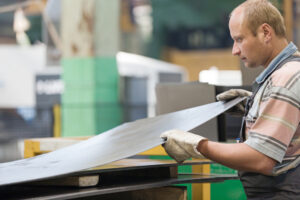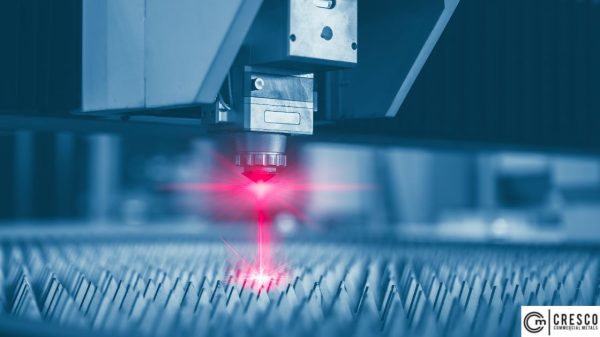Top Innovative Trends in Aluminum Fabrication for 2025 and Beyond
Metalworking is a domain subjected to rapid change, and aluminum is at the center of this transformation. Aluminum is known for its lightweight, versatility, and corrosion resistance features. It is widely applied in industries across automotive, renewable energy, construction, and aerospace. If a metal fabrication company wants to stay ahead of the curve, it must understand the emerging trends.
We have already spent more than half of 2025. Being a modern fabricator, one should possess a sound knowledge of new advancements in technology, design, and sustainability – these are redefining the possibilities in custom metal fabrication. In this blog, we will understand the top innovative trends shaping the future of aluminum fabrication and how they could help businesses achieve efficiency, precision, and long-term success.
Automation and smart manufacturing
Automation is a very popular name transforming the field of metalworking. However, in 2025, the trend is becoming new and more advanced. It includes AI-driven CNC machining and intelligent systems that enable aluminum fabrication companies to streamline processes and reduce errors.
- AI monitoring systems detect faults and resolve them in real time.
- Predictive maintenance through IoT sensors eliminates downtime and increases productivity.
- Robotics in welding and cutting assures consistency in complex designs.
These shifts enable fabricators to provide faster turnaround times while maintaining extreme quality standards.
Sustainable fabrication practices
Sustainability is no longer an option – it is a necessity. Aluminum remains the most recyclable metal; however, fabrication companies need to take it a step further by adopting eco-friendly practices.
- Closed-loop recycling systems are eliminating waste
- Energy-efficient furnaces, as well as machining equipment, decrease carbon emissions
- Eco-friendly coatings and finishes offer durability without harmful chemicals
An aluminum fabrication company that includes green practices can appeal to industries like construction and automotive, where sustainability goals are driving procurement decisions.
Advanced alloys for performance
Conventional aluminum alloys are paving the way for next-generation materials that combine extreme strength with lighter weight.
- High-strength aluminum-lithium alloys are gaining popularity in aerospace for decreasing fuel consumption.
- Heat-resistant alloys can be used in electric vehicle components to tolerate extreme operational temperatures.
- Corrosion-resistant alloys are essential for offshore and marine structures.
An aspirant metal fabrication company can utilize these alloys to cater to a broader range of sectors with advanced requirements.
Precision through CNC and Laser technologies
Industries requiring extreme tolerances and precise machining are becoming the cornerstone of metal fabrication, with customized features.
- Complex geometries that were previously impossible are now possible with the help of 5-axis CNC machining.
- For faster production and cleaner edges, fabricators are using fiber laser cutting.
- If you want more flexibility, then you undeniably believe in the capability of hybrid machining systems paired with additive manufacturing.
Aluminum fabricators are following these trends for producing metal parts with unmatched precision while saving time and material.
Integration of additive manufacturing (3D printing)
For full-scale production, companies can move beyond prototyping and select additive manufacturing or 3D printing.
- Design lightweight, complex structures for automotive and aerospace.
- Eliminate lead times for custom parts
- Eliminate material waste compared to conventional machining
When paired with custom metal fabrication techniques, additive manufacturing provides new possibilities for cost savings and innovation.
Digital twin technology
The actual game-changer is digital twin technology, particularly for the aluminum fabrication industry. It is a virtual model that includes a product, process, or system for testing and simulating before production.
- Engineers can identify potential design flaws initially
- Fabricator can optimize workflows for efficiency
- Maintenance schedules can be predicted with precision
These features can decrease the initial cost, elevate reliability, and meet strict client specifications.
Modular fabrication and customization
Sectors rapidly need tailor-made solutions instead of a single solution for all products. Modular fabrication provides –
- Customizable parts that can be assembled into bigger systems.
- Decreased downtime, particularly when replacing damaged parts.
- Design flexibility for businesses like energy and construction.
Why these trends are worthy for fabricators
Adapting innovative techniques can help you reach the top of the curve. By investing in sustainability, automation, and advanced alloys with accurate technologies, businesses can reduce costs through efficiency, provide supreme quality to clients, extend into new industries and markets, and build a leading reputation in this industry.

FAQs on Aluminum Fabrication Trends
Q1. How is automation changing aluminum fabrication?
Automation utilizes robotics, AI-driven systems, and IoT-enabled monitoring to enhance fabrication safety, speed, and precision.
Q2. Why is sustainability important for an aluminum fabrication company?
Sustainability helps sectors like construction and automotive that prioritize environmentally friendly operations by reducing waste and energy consumption.
Q3. What role does custom metal fabrication play in modern industries?
Custom fabrication enables companies to develop solutions that are precisely suited to the needs of the aerospace, automotive, construction, and renewable energy industries.
Q4. How can a metal fabrication company stay competitive in 2025 and beyond?
By implementing cutting-edge technologies such as digital twin systems, additive manufacturing, CNC machining, and sustainable practices, we can achieve significant improvements.


